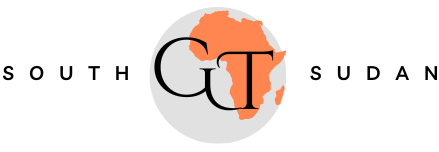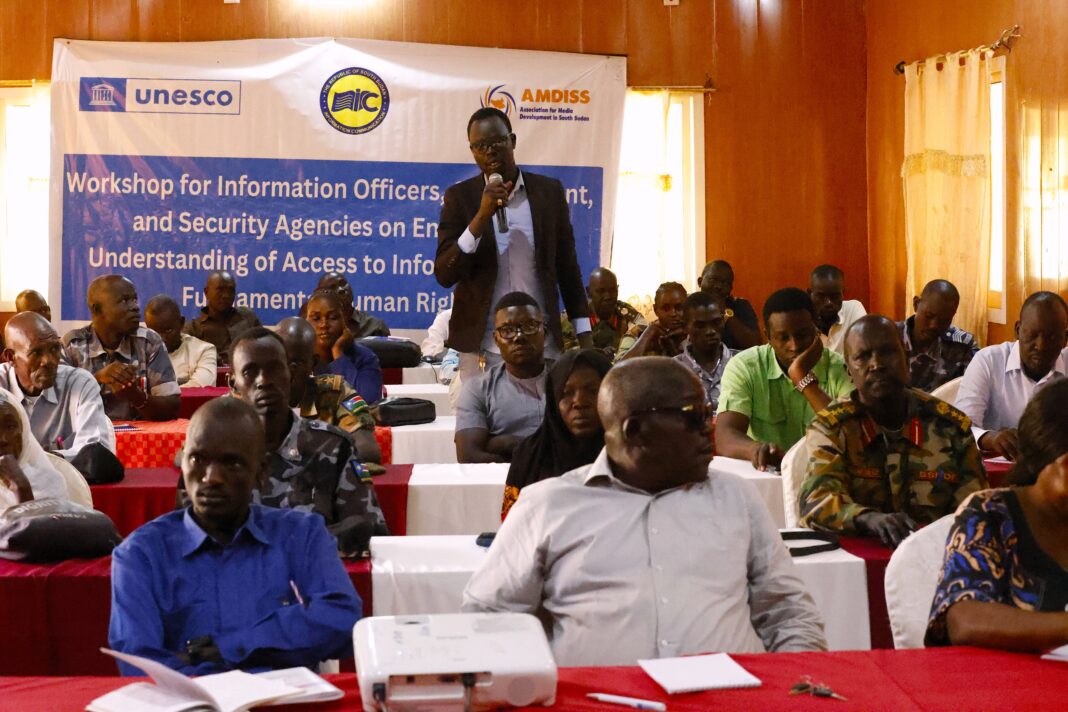Participants during the workshop for information officers, security agencies, and government institutions on the right of access to information at Universal Gab Hotel in Wau. |Credit: AMDISS Facebook Page|.
Wau—28 October 2024—The United Nations Educational, Scientific and Cultural Organisation (UNESCO) in collaboration with the Association for Media Development in South Sudan (AMDISS) enlightened the information officers, security organs, and directors of government institutions on the right of access to information at Universal Gab Hotel in Wau, Western Bahr El-Ghazal State on 22 October 2024.
The workshop brought together 30 participants mostly from the SSPDF (South Sudan People’s Defence Forces), South Sudan Police Service, Military Intelligence, and members of the National Security Service, enhancing the understanding of the right of access to information as a fundamental right guaranteed in the Transitional Constitution of the land.
Addressing the opening ceremony, the Commissioner for Access to Information Commission, Hon. Moyiga Korokoto Nduru said access to information belongs to every citizen in the Republic of South Sudan, not only journalists.
Moyiga acknowledged the importance of access to information in developing a vibrant and democratic society making it easy for the citizens to venture into entrepreneurship and promoting scientific research in the world’s youngest nation full of investment potential.
“You need to know all the relevant information to do business in Taiwan. You cannot be a successful investor without having access to credible information on investment fortunes in society. We in the Ministry of Information are fully prepared for elections. Very soon, we are going to upload huge amounts of information on our websites ahead of the 2026 general elections,” Moyiga disclosed.
He appealed to journalists to use local languages when disseminating messages about elections for the population to understand the procedures of voting and accessing the polling stations.
He also advised the media to be inclusive enough by adopting sign language in their programming to enable people with hearing impairment to participate in the electoral processes effectively.
“You need a sign language interpreter to interpret the messages to people with deaf impairment,” Moyiga stressed. “The deaf people need to know how they are going to vote in the election. You also need enough information for a disabled person if the voting is going to take place. This is what we call access to information. They need relevant information. Our role is to protect and promote access to information not only to people in Juba but to everybody. This is part of our plan to make sure that everyone accesses the information.”
Western Bahr El-Ghazal State’s Minister of Information and Communication, Hon. Samuel Nichola Kornelio commended AMDISS and UNESCO for training the organized forces, army, National Security Service, and information officers on how they can cooperate with the media to ensure that credible information is made available to the public.
“Thank you to UNESCO and AMDISS for extending the training to Western Bahr El-Ghazal State. Today we gather not only to learn about access to information but to reaffirm our commitment to access to information as a fundamental pillar for democracy. This right is essential for empowering the citizens, enhancing transparency, promoting accountability, and fostering good governance. It is crucial in building a society where individuals can make informed decisions that create a positive impact in their communities,” Nichola said.
The minister said Western Bahr El-Ghazal State has witnessed a growing recognition of access to information as a human right, saying information is a driving power for the prosperity of a democratic society.
Paul Night, the representative of UNESCO reiterated their commitment to continue supporting AMDISS to train the journalists and government institutions on how to foster the right of access to information.
He said in June this year, AMDISS through UNESCO trained over 40 state directors, journalists, organized forces, and the army in Wau on the country’s legal frameworks, press freedom, access to information, and other laws necessary for building a progressive and democratic society.
Mr. Paul conveyed the greetings of UNESCO Country Representative, Mr. Julius Banda to the people of Western Bahr El-Ghazal State, urging the public information officers to facilitate access to information to the media houses to contribute to building a vibrant and democratic country.
AMDISS Advocacy and Communication Manager, Mr. Juma Peter, lauded the state government and UNESCO for maintaining support to media houses amid the growing challenges in the country.
He disclosed that media censorship and obstruction of access to information remain among the top challenges media houses and journalists face in South Sudan.
“Media censorship is on top of the main challenges facing the media and journalists in South Sudan. Investigative journalism is completely dead in South Sudan. Journalists are feeling scared to report on hard stories for instance, following up on the money, uncovering malpractices of the public finances, human rights abuses and violations, abuse of power, and reporting on the issues affecting the day-to-day life of the citizens of South Sudan,” Peter said.
He affirmed the commitment of AMDISS through its training wing, Media Development Institute, to reach out to media houses and journalists across the country with tailor-made training, mentorship, and in-house training to ensure that the journalists report professionally to reduce harm.
Peter called on UNESCO and other partners to join hands in upgrading the standards of radio stations, especially in rural areas, and enhance the living standards of journalists to be able to perform their duties effectively.
“I understand that most of the radio stations especially in the rural areas are facing numerous challenges including equipment breakdown and power issues. There is a need to increase funding to radio stations and the support should not only be limited to training packages but should be extended to procuring radio equipment and providing incentives to journalists to perform their duties professionally,” he asserted.
He also entreated the armed forces and security agencies to normalize their relationship with the media houses, build trust, and work together for the public interest.
Mr. Ibrahim Gamar is a guest writer for The Golden Times South Sudan. He is based in Wau, Western Bahr El-Ghazal State.




